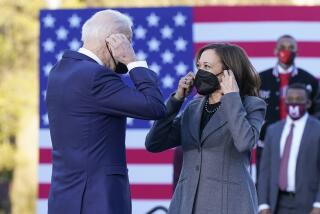Bush Sets the More Civil Tone
- Share via
A cynic might argue that the Bush Administration is trying to play “good cop-bad cop” on civil rights. We prefer to believe that his own government’s obvious confusion on the question is one of the reasons the President has chosen this moment to mount his bully pulpit.
In a speech Wednesday, Bush praised Dr. Martin Luther King Jr. and said the Administration would “live up to the highest ideals of the civil-rights movement.” To that end, he pledged “to fight against poverty and for opportunity.” These are welcome sentiments, well-expressed.
Almost simultaneously, however, Atty. Gen. Dick Thornburgh said he would recommend that the President veto this year’s most important piece of civil-rights legislation. That bill, which was approved by the Senate Labor and Human Resources Committee on Wednesday, would overturn a series of recent U.S. Supreme Court decisions that have undermined the foundations of the federal government’s long effort to root out job discrimination. Thornburgh said he opposed the measure because it would “encourage quota systems (and) divide our society along racial lines.” This ideological obsession with fictional quotas masquerading as “colorblindness” was one of the hallmarks of the Reagan Administration’s mean-spirited approach to civil rights.
Thornburgh does not even apply it with consistency. One of the court decisions he defends as “colorblind”--Price-Waterhouse vs. Hopkins--in fact allows employers to consider race and sex as a “factor” in awarding promotions so long as that factor is not the decisive one. Another of the cases--Martin vs. Wilkes--virtually guarantees a deepening of racial divisions by reopening hundreds of current city and county affirmative-action plans to court challenges by white males who feel that they have been discriminated against.
The Bush Administration needs to speak with one voice on these critical questions--and that voice ought to be the President’s.
More to Read
Get the L.A. Times Politics newsletter
Deeply reported insights into legislation, politics and policy from Sacramento, Washington and beyond. In your inbox twice per week.
You may occasionally receive promotional content from the Los Angeles Times.










